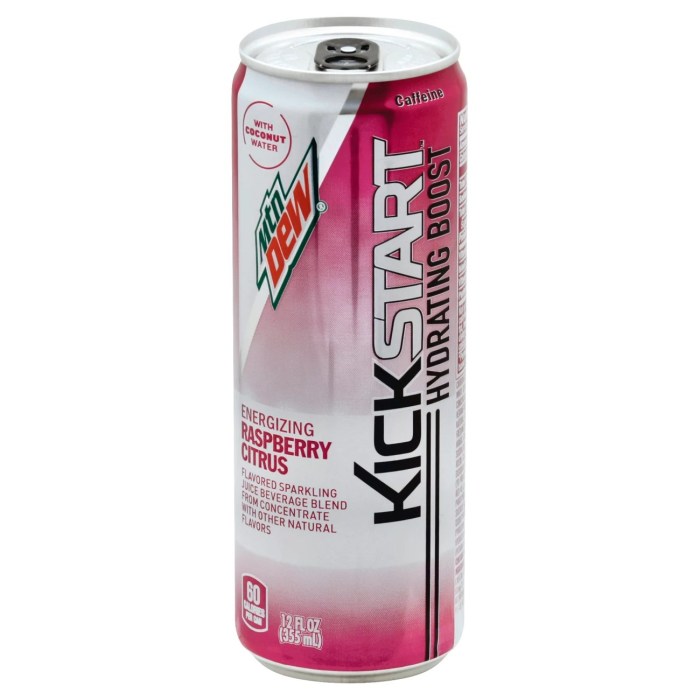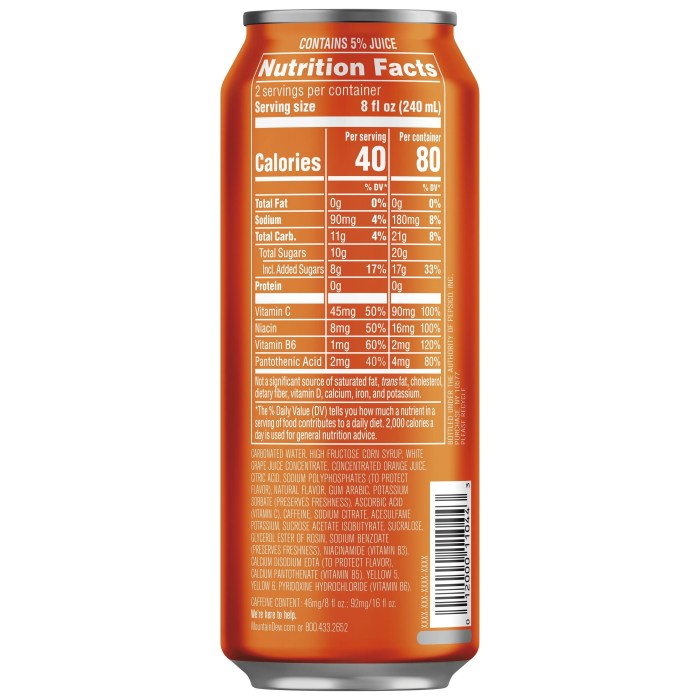Caffeine Content and Effects

Mountain dew kickstart nutrition facts – Yo, Medan peeps! Let’s talk caffeine – specifically, the jolt you get from Mountain Dew Kickstart. We’re diving deep into the caffeine content and how it affects your body, from that awesome energy boost to potential downsides. It’s all about being informed, so you can enjoy your Kickstart responsibly.
A standard 16-ounce can of Mountain Dew Kickstart typically contains around 92mg of caffeine. This is a pretty significant amount compared to other popular drinks. For instance, a similar-sized cup of brewed coffee can range from 80-150mg, while a cup of black tea usually has around 30-50mg. Energy drinks, depending on the brand and size, often contain even higher levels of caffeine.
So, Kickstart sits comfortably in the middle to higher range of caffeinated beverages.
Caffeine’s Impact on the Body
Caffeine is a stimulant that affects your central nervous system. The effects are multifaceted, impacting everything from your energy levels and mood to your sleep patterns and even your heart rate. Let’s break it down.
On the positive side, caffeine can increase alertness and improve cognitive function, making you feel more awake and focused. Many people rely on that morning coffee or afternoon Kickstart to power through their day. It can also enhance physical performance, providing a temporary boost to your endurance and strength during workouts. Think of it as a short-term performance enhancer, but remember it’s not a magic bullet.
However, excessive caffeine consumption can lead to negative consequences. Too much caffeine can cause anxiety, jitters, restlessness, and even insomnia. It can also disrupt your sleep patterns, leading to fatigue and decreased performance in the long run. Furthermore, high doses of caffeine can potentially increase your heart rate and blood pressure, which isn’t ideal for individuals with pre-existing heart conditions.
Mountain Dew Kickstart, while offering a caffeinated boost, is notably high in sugar and artificial sweeteners. A contrasting nutritional profile is found in foods like lean ground beef, where the nutritional value depends heavily on the cut; for detailed information, consult this resource on minced meat nutrition facts. Understanding both profiles highlights the significant differences in macronutrient composition between these vastly different food and beverage choices, impacting overall dietary intake.
Moderation is key, my friends.
Visual Representation of Caffeine Content
Imagine a bar graph. The horizontal axis lists the beverages: Mountain Dew Kickstart, Coffee, and Tea. The vertical axis represents caffeine content in milligrams (mg).
The bar representing Mountain Dew Kickstart reaches a height indicating approximately 92mg. The coffee bar is taller, extending to a range reflecting 80-150mg, showing its variability. Finally, the tea bar is significantly shorter, reaching only 30-50mg. This visual clearly demonstrates that while Kickstart provides a substantial caffeine kick, coffee generally contains more, and tea considerably less.
Comparison with Other Energy Drinks: Mountain Dew Kickstart Nutrition Facts

Yo, Medan peeps! Let’s get real about Mountain Dew Kickstart and how it stacks up against other energy drinks. We’re not just talking about the sugary rush; we’re diving deep into the nutritional profiles, caffeine levels, and all that jazz. Think of this as your ultimate energy drink showdown!
Comparing energy drinks can be tricky because the formulations vary wildly. Some focus on massive caffeine hits, others prioritize natural ingredients (yeah, right!), and some just go all-in on the sugar. We’ll break down the key differences and similarities so you can make the most informed choice for your next caffeine fix.
Nutritional Profile Comparison of Popular Energy Drinks, Mountain dew kickstart nutrition facts
Here’s a table comparing Mountain Dew Kickstart to a few other popular energy drinks. Remember, these are average values and can vary slightly depending on the specific flavor and serving size. Always check the label for the most accurate information!
| Energy Drink | Serving Size (oz) | Sugar (g) | Caffeine (mg) | Other Notable Ingredients |
|---|---|---|---|---|
| Mountain Dew Kickstart (Original) | 16 | 21 | 92 | B Vitamins, Natural & Artificial Flavors |
| Red Bull (Original) | 8.4 | 27 | 80 | B Vitamins, Taurine, Glucuronolactone |
| Monster Energy (Original) | 16 | 54 | 160 | B Vitamins, Taurine, Glucuronolactone, Guarana |
| Celsius (Tropical Vibe) | 12 | 1 | 200 | Guarana, Green Tea Extract, Ginger, Vitamins |
As you can see, there’s a wide range in sugar and caffeine content. Mountain Dew Kickstart sits somewhere in the middle in terms of sugar, while its caffeine content is relatively lower compared to Monster. Celsius stands out with its significantly lower sugar and higher caffeine, often marketed towards a fitness-conscious crowd. Red Bull, a classic, falls somewhere between Kickstart and Monster in both sugar and caffeine.
Clarifying Questions
Is Mountain Dew Kickstart suitable for diabetics?
Nah, ini agak tricky. Karena tinggi gula, orang diabetes harus banget hati-hati. Konsultasi sama dokter dulu, ya! Jangan asal minum!
Can I drink Mountain Dew Kickstart every day?
Aduh, jangan gitu dong! Ntar badanmu protes. Minum secukupnya aja, jangan kebanyakan. Bayangin aja, kalau tiap hari minum, dompet kamu juga yang protes!
Does Mountain Dew Kickstart have any vitamins?
Wah, jangan berharap banyak. Kandungan vitaminnya sedikit banget. Lebih baik cari vitamin dari buah dan sayur, deh!
How does Mountain Dew Kickstart compare to other fruit juices?
Ya ampun, beda jauh! Jus buah jauh lebih sehat. Gula alaminya lebih rendah, dan ada vitaminnya lagi. Mountain Dew Kickstart lebih ke minuman ‘energi’ yang bisa bikin semangat, tapi juga bisa bikin badan lemas kalau kebanyakan.
